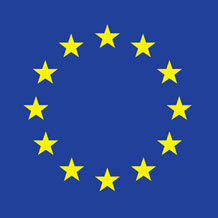
European Union flag.
EU voter apathy and the media
Millions of voters across 27 counties are eligible to cast their votes for the sole institution in the European Union that is directly elected by the people.
However, voter turnout for the European parliamentary elections is expected to be the lowest for 30 years.
Questions as to why apathy surrounds the elections may have numerous contributing factors; ranging from blame being laid at the door of parliament to inadequate media coverage and European institutions failing to educate the electorate.
As part of a major pan-European project currently evaluating electoral democracy within Europe, experts in political science at the University of Exeter and the University of Amsterdam are engaged in monitoring the media coverage of the election the campaign.
The new research will inform part of a three year study analysing data collected from surveys of MEP candidates, media monitoring, political party manifestos and citizens’ surveys within the context of the 2009 European Parliamentary election. Funded by the European Union under the Seventh Framework Programme the project will asses the feasibility of providing an infrastructure for research into citizenship, political participation, and electoral democracy in the European Union.
Although it is too early to have any reports from the collection of media data, Associate Professor of Political Science Susan Banducci, of the University of Exeter, conducted a similar study in 2004 and 1999. She said, ‘We found very little coverage in the press and on TV, and if there was any evaluation of the European Union (EU) in the news it tended to be negative. However, this was less so in new member states in 2004 where coverage was more prominent. In general reports tended to be focus on a domestic rather than EU level political actors.’
She added, These indicators of media coverage are important because follow on research has indicated EU visibility is important for turnout and overall levels of knowledge and information about the EU.’
Democratic rules and procedures at EU level are not as well established as in most of its member states. Institutions of multi-level governance undergo frequent reforms, so that ‘auditing’ the quality of the electoral process at the EU level is thought to be essential according to Professor Banducci.
The collaborative project is being co-ordinated by the European University Institute and its Robert Schuman Centre for Advanced Studies involving researchers from 14 institutions in western and eastern Europe and experts from all EU member states.
In a further EU 7th Framework funded programme of research, Professor Banducci will be co-ordinating the Marie Curie Initial Training Network on Electoral Democracy. This four year project brings together 14 partners in higher education and industry to research elections, electoral behaviour, media and political parties starting in October this year.
Date: 3 June 2009
